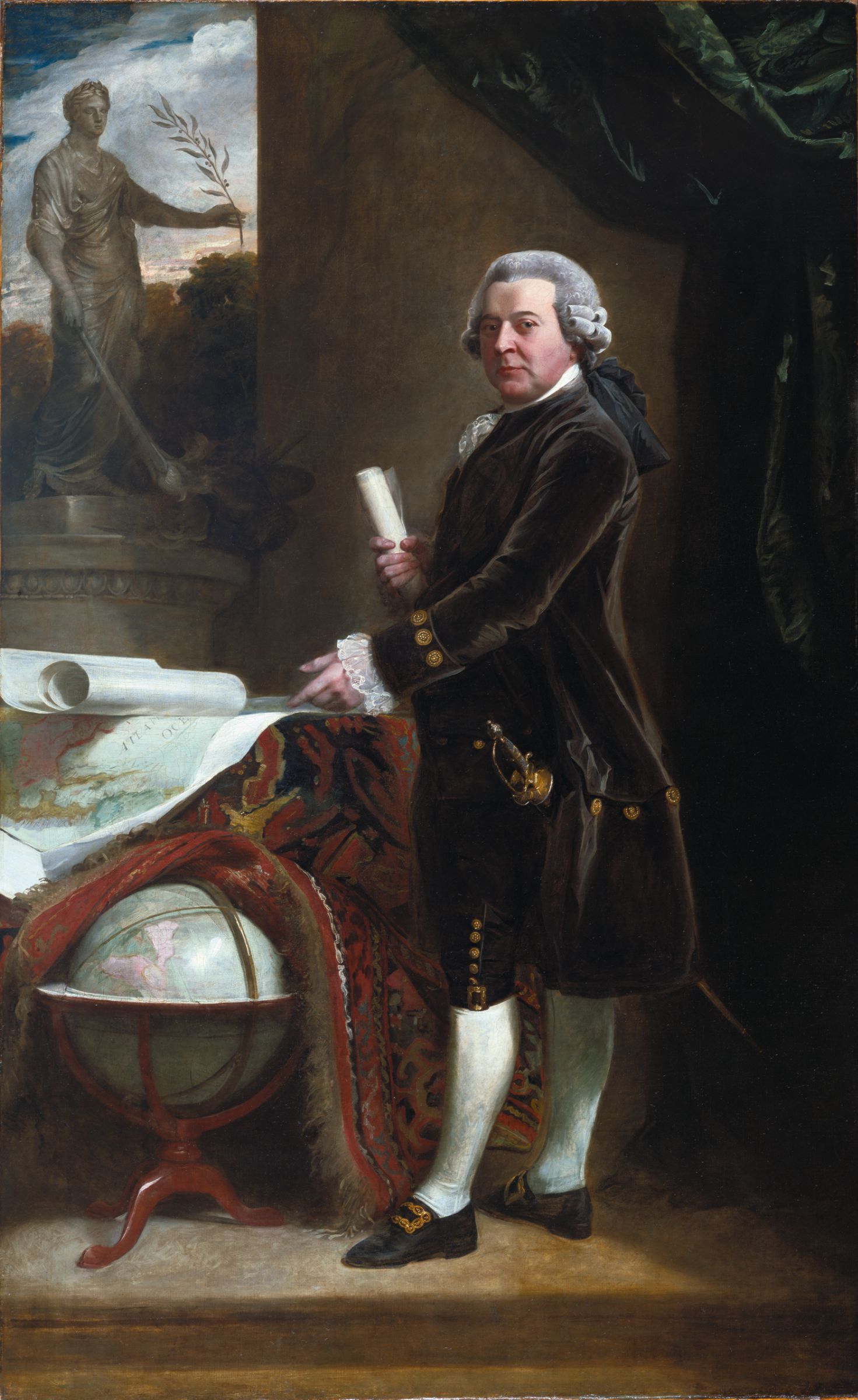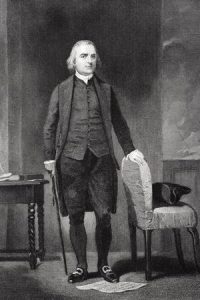Samuel Adams (1722-1803) and his second cousin, John Adams (1735-1826), were important and longstanding actors in the struggle for American independence. John Adams expounds on this in his diary on February 9, 1772:
Is it not a pity that a brace [pair] of so obscure a breed should be the only ones to defend the household, when the generous mastiffs and best-blooded hounds are all hushed to silence by the bones and crumbs that are thrown to them, and even Cerberus himself is bought off with a sop? … they [John and Samuel Adams] have a sense of honor and a love of their country, the testimony of a good conscious, and the consolation of philosophy, if nothing more, which will certainly support them, in the cause of their country, to their last gasp for breath, whenever that may happen.1

This “brace of Adamses” kept their word and continued to advocate for the liberty of their country through the War for Independence, and throughout the course of their lives, as demonstrated by a series of letters between them in 1790. John Adams was the vice president of the US and Samuel was the lieutenant-governor of Massachusetts during this period. Published in 1802 under the title Four Letters, discuss the future government of America from the perspectives of both the Federalist John Adams and the Anti-Federalist Samuel Adams.
John Adams, responding to an earlier letter from Samuel, recounts a recent visit to Philadelphia:
The sight of our old Liberty Hall and of several of our old friends, had brought your venerable idea to my mind, and continued it there a great part of the last week; so that a letter from you, on my arrival, seemed but in continuation.2
He then asks Samuel:
What, my old friend, is this world about to become? Is the millennium commencing? Are the kingdoms of it about to be governed by reason? Your Boston town meetings and our Harvard College have set the universe in motion. Every thing will be pulled down. So much seems certain. But what will be built up? Are there any principles of political architecture? What are they?3
Samuel Adams answers this query in his response:
You ask,—what the is about to become? and,—is the millennium commencing? I have not studied the prophecies, and cannot even conjecture. The golden age, so finely pictured by poets, I believe has never as yet existed but in their own imagination. … The same tragedies have been acted on the theatre of the world, the same arts of tormenting have been studied and practiced to this day and even religion and reason untied have never succeeded to establish the permanent foundation of political freedom and happiness in the most enlightened countries on the earth.4
The elder Adams, as he turns his attention towards the hopeful element that he sees in mankind, becomes more positive:
The love of liberty is inter-woven in the soul of man, and can never be totally extinguished and there are certain periods when human patience can no longer endure indignity and oppression. The spark of liberty then kindles into a flame, when the injured people, attentive to the feelings of the just rights, magnanimously contend for their complete restoration.5
He reverts to his previous manner as he recounts how history shows that so often these sparks of freedom lead not to the flame of liberty, but rather to the flame of tyranny, remarking that, “such contests have too often ended in nothing more than ‘a change of impostors and impositions.’”6 Seeing that such a threat faces America as well, Samuel Adams explains the only hope he sees for preserving liberty:
Let the divines and philosophers, statesmen and patriots, unite their endeavors to renovate the age, by impression the minds of men with the importance of educating their little boys and girls; of inculcating in the minds of youth the fear and love of the Deity and universal philanthropy, and, in subordination to these great principles, the love of their country; instructing them in the art of self-government, without which they never can act a wise part in the government of societies, great or small; in short, of leading them in the study and practice of the exalted virtues of the Christian system, which will happily tend to subdue the turbulent passions of men, and introduce that golden age…7

Samuel, having placed his hopes in subsequent generations’ education in the tenets of true virtue, quips: “When this millennium shall commence, if there shall be any need of civil government, indulge me in the fancy, that it will be in the republican form, or something better.8
In his response, John Adams expresses his own pessimism regarding the nation’s—and more generally the world’s—ability to provide such an education. He agrees with his older cousin but reflects:
I think with you, that knowledge and benevolence ought to be promoted as much as possible; but, despairing of ever seeing them sufficiently general for the security of society, I am for seeking institutions which may supply in some degree the defect. If there were no ignorance, error, or vice, there would be neither principles nor systems of civil or political government.9
In this, the difference surfaces between the two Adams’. Anti-federalist Samuel Adams prefers to hope for the elevation of the people to a sufficient capability for self-government, while federalist John Adams places his hopes in the ability of an active government to preserve the safety of the nation by institutional means. Both aim for the secured liberty of America, but one seeks to achieve it by strengthening the people first, while the other aims to strengthen the government first. John Adams further explains his position:
With you, I have also the honor most perfectly to harmonize in your sentiments of the humanity and wisdom of promoting education in knowledge, virtue, and benevolence. But I think that these will confirm mankind in the opinion of the necessity of preserving and strengthening the dikes against the ocean, its tides and storms. Human appetites, passions, prejudices, and self-love will never be conquered by benevolence and knowledge alone, introduced by human means.10
John also takes a different route regarding the effects of the people’s strong affection for liberty and freedom so lauded by Samuel Adams. The younger says:
The numbers of men in all ages have preferred ease, slumber, and good cheer to liberty, when they have been in competition. We must not then depend alone upon the lover of liberty in the soul of man for its preservation. Some political institutions must be prepared, to assist this love against its enemies. Without these, the struggle will end only in a change of impostors. … Let us be impartial, then, and speak the whole truth. Till we do, we shall never discover all the true principles that are necessary.11
To the objections on the primacy of universal education over a strong government Samuel Adams responds:
I am very willing to agree with you, in thinking that improvements in knowledge and benevolence receive much assistance from the principles and systems of good government. But is it not as true that, without knowledge and benevolence, men would neither have been capable nor disposed to search for the principles or form the system? Should we not, my friend, bear a grateful remembrance of our pious and benevolent ancestors, who early laid plans of education? by which means, wisdom, knowledge, and virtue have been generally diffused among the body of the people, and they have been enabled to form and establish a civil constitution, calculated for the preservation of their rights and liberties.12
He then continues to argue for the necessity of a widespread educational system directed towards the moral development of the community:
I am far from thing the people can be deceived, by urging upon them a dependence on the more general prevalence of knowledge and virtue. It is one of the most essential means of further, and still further improvements in society, and of correcting and amending moral sentiments and habits and political institutions; till, “by human means,” directed by Divine influence, men shall be prepared for that “happy and holy state,” when “the Messiah is to reign.”13
Samuel Adams end by expressing that while John views government as the tool which will level both the aristocracy and the people, he believes that education is the true leveling agent:
Wise and judicious modes of education, patronized and supported by communities, will draw together the sons of the rich and the poor, among whom it makes no distinction; it will cultivate the natural genius, elevate the soul, excite laudable emulation to excel in knowledge, piety, and benevolence; and, finally, it will reward its patrons and benefactors, by shedding its benign influence on the public mind. Education inures men to thinking and reflection, to reasoning and demonstration. It discovers to them the moral and religious duties they owe to God, their country, and to all mankind.14
These four letters provide a window into the party conflicts which were raging between the Federalists and Anti-Federalist—though they show a much more civil and thoughtful tone than was generally seen at the time. In its most basic form, the “brace of Adamses” are seeking to answer how best the freedom of society can be improved. While they both value the necessities for education and political principles, the real difference arises from where they place primacy.
Endnotes
1 John Adams, February 9, 1772, The Works of John Adams (Boston: Charles C. Little and James Brown, 1850) 2:295-296.
2 The Works of John Adams (Boston: Charles C. Little and James Brown, 1851) 6:411.
3 John Adams to Samuel Adams, September 12, 1790, Works (1851), 6:411-412.
4 Samuel Adams to John Adams, October 4, 1790, Works (1851), 6:412.
5 Samuel to John, October 4, 1790, Works (1851), 6:413.
6 Ibid.
7 Samuel Adams to John Adams, October 4, 1790, Works (1851), 6:414.
8 Ibid.
9 John Adams to Samuel Adams, October 18, 1790, Works (1851), 6:415.
10 Adams to Samuel Adams, October 18, 1790, Works (1851), 6:416.
11 Adams to Samuel Adams, October 18, 1790, Works (1851), 6:418.
12 Samuel Adams to John Adams, November 1790, Works (1851), 6:422.
13 Samuel Adams to John Adams, November 1790, Works (1851), 6:423.
14 Samuel Adams to John Adams, November 1790, Works (1851), 6:425.
Still looking for answers? Visit our FAQ page
More Resources
Know the Truth and Protect Your Freedoms.
Still looking for answers? Visit our FAQ page
Stay Informed with the Latest Resources
Enter your email address to receive our regular newsletter, with important information and updates right in your inbox!










